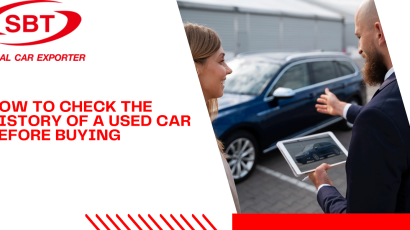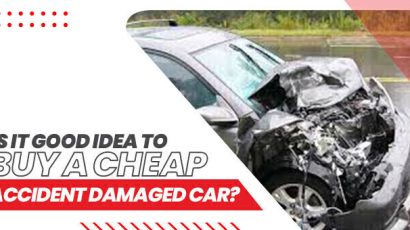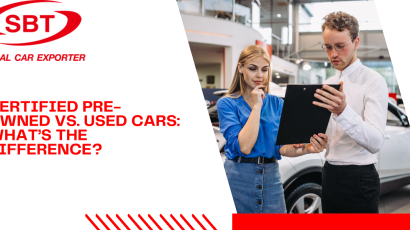
When searching for a used vehicle, it’s common to come across cars with an accident history. This fact can trigger an internal debate: should you take the plunge or steer clear? Buying a used car with an accident history presents its own set of challenges, but it can also offer financial benefits. This blog will explore the pros and cons, key factors to consider, and precautions you should take before purchasing a car with a checkered past.
Purchasing a used car can be a smart financial move. However, when a vehicle has a history of accidents, buyers often face a dilemma. Understandably, most people feel apprehensive about buying a car that’s been through some rough patches. The primary concerns often revolve around the vehicle’s reliability, safety, and potential hidden issues. But should you dismiss a used car with an accident history outright? Or is there a way to ensure you’re getting a dependable ride?
This guide will dive into what you should know about cars with accident histories, why some of them might still be good deals, and how to make an informed decision if you decide to buy one.
Pros and Cons of Buying a Car with an Accident History
Advantages: Lower Price Tags and Potential Deals
The cheaper cost of a second-hand car with an accident history is among the strongest arguments in favor of it. Vehicles with accident histories typically have far lower prices than comparable models without a history. This feature can be highly alluring if you’re trying to get more for your money or are on a limited budget.
Furthermore, dealerships and private sellers are aware of the stigma attached to accident history, so they often lower their asking price. By being open to these options, you can afford a higher-end vehicle or a model with better features.
Disadvantages: Reliability Concerns and Resale Value
The flip side, however, involves the question of reliability. Depending on the severity of the accident and the quality of repairs done afterward, you could end up with a vehicle that demands constant upkeep or, worse, poses safety risks. Even minor accidents can lead to long-term mechanical issues if not properly addressed.
Another disadvantage is that cars with accident histories usually have lower resale values. If you plan on upgrading in a few years, your vehicle might not retain its value as well as one with a clean history.
What to Consider Before Buying a Used Car with an Accident History
1. Type and Severity of the Accident
Not all accidents are equal. A fender-bender that merely required some paintwork is vastly different from a major collision that affected the car’s frame. When considering a used car with an accident history, inquire about the nature of the incident. The best source for this information is a comprehensive vehicle history report, such as those provided by Carfax or AutoCheck.
If the accident involved structural or frame damage, you may want to reconsider. Frame damage can compromise the car’s integrity and safety, and it’s difficult to restore it to the same level as a factory-built frame.
2. Quality of Repairs
The quality of repairs can make or break the car’s longevity. If repairs were handled by a certified repair shop or the original dealership, there is a higher chance that the car has been restored to its pre-accident condition. However, not all repair shops are created equal, and subpar work can lead to mechanical failures down the line.
Therefore, it is important to inspect the vehicle thoroughly or, better yet, bring along a competent mechanic. Check for any misalignments, irregularities in paint, or poorly installed components. Also, you must review the repair invoices to find the parts that were replaced and how comprehensive the repairs were.
3. Professional Inspection and Test Drive
A visual inspection is not enough to judge a vehicle’s condition. Always schedule a professional pre-purchase inspection. A skilled mechanic can check for signs of frame damage, unreported repairs, and mechanical issues that may arise from past accidents.
A test drive is also very important. Keep an eye out for odd noises, vibrations, or inconsistent steering throughout the test drive. If something feels off, it might indicate deeper issues caused by past damage.
4. Title Status and Insurance Implications
When a vehicle has been in a severe accident, it could receive a “salvage title” or “rebuilt title” from the insurance company. A salvage title indicates that the insurance company considered the vehicle a total loss, whereas a rebuilt title means it was repaired and deemed roadworthy.
Therefore, a vehicle with a salvage or rebuilt title is usually cheaper but comes with greater risks and less resale potential. Additionally, insuring such vehicles can be more expensive or more difficult, as some insurance companies may not provide full coverage for cars with branded titles.
How to Minimize Risk When Buying a Car with an Accident History
1. Obtain a Detailed Vehicle History Report
A history report is the first step in understanding a vehicle’s past. It provides information on previous accidents, title changes, ownership records, and more. Reports from well-known and trustworthy sources include Carfax, AutoCheck, and the National Motor Vehicle Title Information System (NMVTIS). They can help you identify red flags and give you an edge in negotiating.
2. Hire a Mechanic for an Independent Inspection
Always have an independent, trusted mechanic inspect the car before purchase. They can spot things that may not be visible to the untrained eye. A thorough examination will evaluate essential components such as the electrical systems, engine, transmission, and suspension. Additionally, the mechanic can look for signs of water damage, which is sometimes misrepresented as collision damage in reports.
3. Verify the Quality of Repairs
If the vehicle’s history indicates an accident, ask the seller for documentation of repairs. Verify whether the repairs were conducted at a certified shop and if OEM (Original Equipment Manufacturer) parts were used. Non-OEM parts or shoddy work could compromise the car’s integrity and safety in future incidents.
4. Ensure a Comprehensive Test Drive
When taking the car for a test drive, take your time. Test it in various conditions like highway speeds, stop-and-go traffic, and uneven roads. Listen for unusual sounds, assess the vehicle’s steering response, and feel for any misalignment or imbalance. These signs could point to poor repairs or ongoing issues.
Should You Buy a Used Car with an Accident History?
There’s no one-size-fits-all answer. It ultimately depends on the type of accident, the extent of repairs, and your budget. If you’re able to find a well-repaired car at a lower price and plan to keep it for several years, a used vehicle with an accident history could be a cost-effective solution.
However, buying such a vehicle demands careful scrutiny. It’s essential to understand what you’re getting into, so don’t skip steps like obtaining a vehicle history report, hiring a mechanic, and conducting a thorough test drive. If you follow these precautions, you can potentially drive away with a dependable car that fits your budget.
Conclusion
In summary, buying a second-hand car with an accident history can be tricky. On the one hand, you get greater value for your money with these cars because they are typically less expensive. On the other hand, they can come with risks like hidden mechanical issues or diminished resale value.
By taking the right precautions—such as reviewing the car’s history, ensuring quality repairs, and conducting a comprehensive inspection—you can mitigate these risks and make a more informed decision.
Ultimately, if you prioritize your budget and make efforts to find a reasonable car, a vehicle with an accident history can be a viable option. Just remember, due diligence is key!
For a sporty option, the Toyota Corolla Sport 2010 price in Nigeria offers competitive value in the current market.











